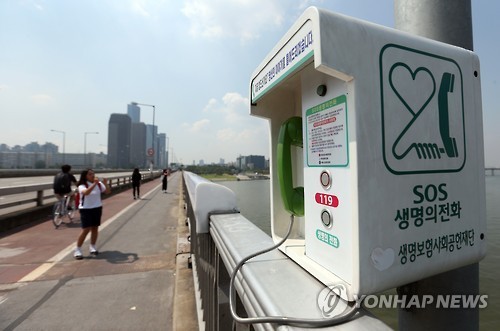Avoidance of psychiatric treatment and alcohol abuse are significantly linked to South Korea’s high suicide rate, a government report showed on Wednesday.
The research, which surveyed 151 family members of 121 suicide victims last year, raised concerns about the nation’s social stigma against people with mental disorders and substance abuse, which often discourages them to seek professional help.
South Korea is notorious for its high suicide rate – the highest among countries within the Organization for Economic Cooperation and Development – with up to about 40 people taking their own lives every day, according to government statistics. Suicide has become the fourth most common cause of death here.
According to the report by the Health and Welfare Ministry, almost 90 percent of suicide victims had diagnosable psychiatric illnesses, such as depression, but only 15 percent of them had received medical treatment regularly before taking their own lives.
 |
| A sign that says “life line,” a phone counseling service for those who consider committing suicide by jumping into the Hangang River, is installed at Seoul’s Mapo Bridge. Yonhap |
Also, while only 25.1 percent of them had visited a psychiatrist at least once in the last 30 days of their lives, a higher proportion of them — 25.6 percent — visited a general physician or a traditional Korean doctor for symptoms such as indigestion or insomnia in the same period.
One of the victims featured in the report, a man in his 40s, visited a general physician after experiencing loss of appetite and weight loss. The physician diagnosed his condition as chronic fatigue and did not advise him to seek help from a mental health professional. According to researchers of the report, it is likely that his condition may have been depression. He took his own life a few months later.
Jeon Hong-jin, a psychiatrist at Samsung Medical Center in Seoul, said many studies have indicated that about 70 to 90 percent of all suicide victims worldwide have a psychiatric illness, including depression. What is unique in South Korea, he said, is the collective avoidance of psychiatric treatment which is deeply linked to the social stigma against people with mental illnesses.
According to a report released by the National Evidence-based Healthcare Collaborating Agency last year, about 5.6 percent of the entire Korean population – about 2 million people – have suffered depression at least once. However, only 290,000 people sought medical help for the condition, as of last year, and an even smaller number of them, 150,000, chose to receive treatment regularly.
“A lot of people are unaware of their mental condition because people avoid visiting psychiatric clinics. But (being unaware of one’s condition) can be dangerous,” psychiatrist Jeon told The Korea Herald.
“When someone with severe depression doesn’t know he is clinically depressed, it’s more likely that he would find his situation hopeless and take his own life. Being diagnosed can give a sense of control, because once you are diagnosed you can learn that there are treatment options available for you to get better.”
The report also showed that 40 percent of the 121 victims were drunk when they committed suicide. Also, 25.6 percent had faced legal, professional and personal conflicts resulting from alcohol abuse. At the same time, 54 percent of the victims had family members who had alcohol abuse problems.
“It can be concluded that alcohol abuse is very closely associated with suicide cases in South Korea and that drinking control is necessary as an intervention measure for suicide prevention,” the report said.
South Korea is known for its culture of binge drinking. According to analysis by the global research firm Euromonitor International, South Koreans were the world’s biggest consumers of hard liquor as of 2014, drinking 11.2 shots per week on average.
Many overseas studies have shown that social isolation is one of the most significant factors that contribute to a number of mental health conditions, including depression, addiction, hoarding and social anxiety.
According to the OECD data last year, 28 percent of Koreans said they have no meaningful social support at all – not a single person they can rely on – in times of crisis. This rate was the highest among the OECD nations.
“Human beings have a natural and innate need to bond, and when we are happy and healthy, we’ll bond and connect with each other,” said British journalist Johann Hari who has researched and written extensively on addiction of all kinds, during TED talk last year. “But if you can’t do that, because you are traumatized or isolated or beaten down by life, you will go with something that will give you some sense of relief (such as drugs or alcohol).”
According to the World Health Organization, alcohol consumption is a causal factor in more than 200 disease and injury conditions worldwide, including cancer, road traffic crashes, violence, and suicides. “Beyond health consequences, the harmful use of alcohol brings significant social and economic losses to individuals and society at large,” the WHO said in its factsheet on the harmful use of alcohol.
The government report on suicide also found that 93.4 percent of victims exhibited some suicide warning signs, such as experiencing a change in sleeping and eating habits, but 81 percent of the victims’ family members did not consider these signs as anything to be alarmed about.
By Claire Lee (dyc@heraldcorp.com)

